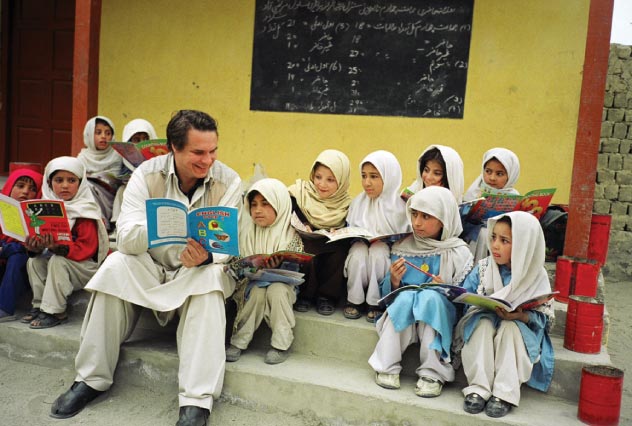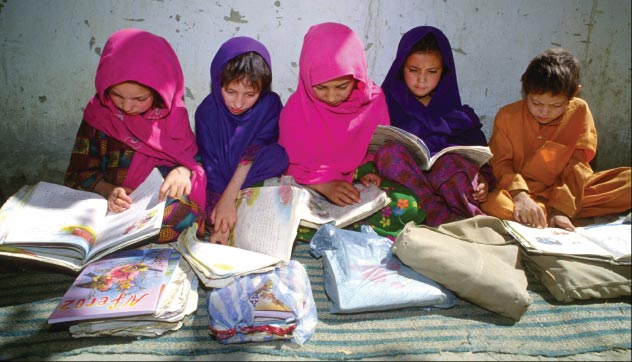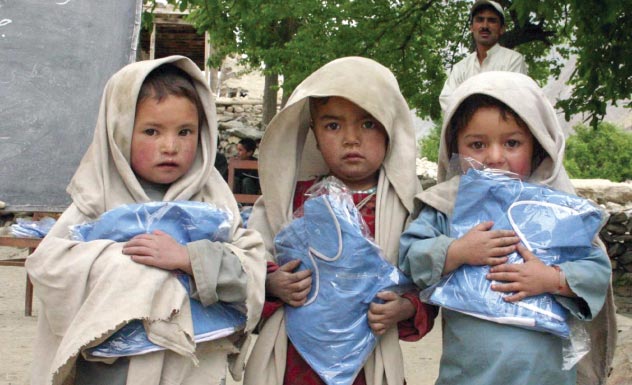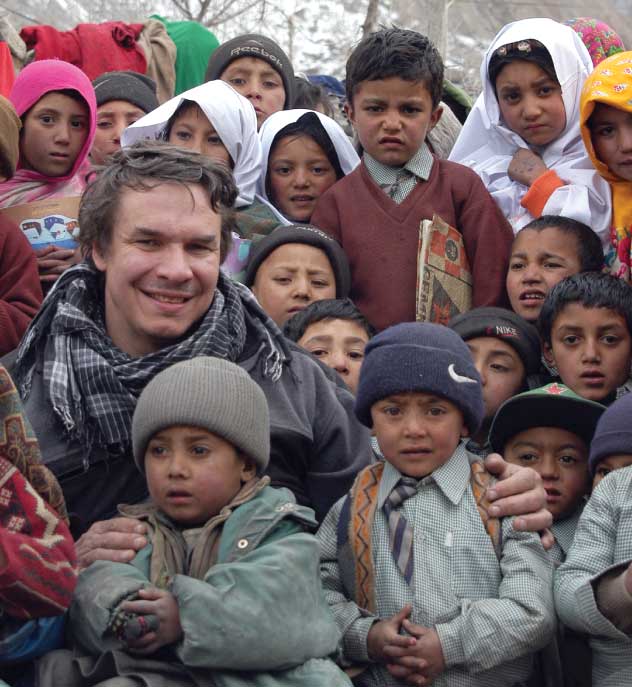COVER STORY
A Different Summit: Teaching Kids in Pakistan
American Greg Mortenson may have failed to scale Pakistan’s treacherous K-2, but on his way back, his friendship with the local villagers started a wonderful relationship as he passionately helped build schools for children in Pakistan’s remotest areas, writes Ras H. Siddiqui.

(Above): Greg Mortenson with schoolchildren in Gultori, Pakistan. [Central Asia Institute photo]
Mount Godwin Austen or K2 is the second highest mountain in the world. It did not come to Sacramento and remains on the border between China and Pakistan’s Northern Areas. But a man who tried to scale it and failed in the attempt in 1993 certainly made quite a tall impression here. Through his life’s journey, he learnt from this failure and succeeded over many other odds to stand today as an ambassador of America’s friendship towards not only the people of Pakistan and Afghanistan but to educators worldwide. In his own humble style of delivery, the co-author of “Three Cups of Tea” and now school builder Greg Mortenson mesmerized over 2,000 members of the audience at the Sacramento Community Theatre in September at an event organized locally. He was the guest of the Sacramento Public Library “One Book Sacramento” series at their “Meet the Authors” program for two days. The other co-author of “Three Cups of Tea,” David Oliver Relin, was the guest of the library in October.
It is important to note here that it all started with sharing a cup of tea (Chai). After his descent from the mountain, a sick and weak Mortenson stepped into a very poor village named Korphe in Pakistan where the locals helped nurse him back to health. From there began a relationship that lasts to this day. Since then Greg has become quite a celebrity. In Northern Pakistan he has a rock star-type following and now many in the U.S. are learning and admiring the good work that he has been doing, too. In Pakistan he has recently been chosen to be awarded one of the highest civilian awards that the state can give, the Sitara-e-Pakistan or Star of Pakistan which he will be receiving early next year.

(Above): Kashmiri refugees in a Pakistani school. [Central Asia Institute photo]
So popular is Greg that during the small reception at the local Hyatt just before the main event, it was difficult to get his undivided attention. But his tall frame and presence was such that it was difficult to ignore. The handful of local Pakistanis and Muslims who attended the reception (most of them were fasting since this was a Ramadan day) need to be commended because they had to break their fast during his speech. And if anyone in America would understand why within an abundance of food, both at this reception and the breakfast or tea the following morning at the Central Library, the Muslim participants were not eating or drinking, Greg Mortenson certainly would.
Greg has come to understand the spiritual aspect of the Muslim faith and its followers. He has made the connection with people on the human level and has developed a deep sense of respect which has been reciprocated. He has made countless friends in Pakistan and Afghanistan but in the process he is considered a threat by extremists of the Taliban variety there. He has even received threats from right here in America after 9/11 for reaching out to people of the Islamic faith. But let us move on.
Greg thanked the Sacramento Public Library for inviting him to speak and appreciated all the support from the community. He lamented the lack of communication in the oral tradition here in the U.S. as opposed to Afghanistan and Pakistan where it dominates and history is passed on from generation to generation. He said that his book “Three Cups of Tea” was an attempt in that direction. He added that the subtitle was changed in the paperback edition upon his request to “One Man’s Mission to Promote Peace…One School at a Time” because the hardcover edition had him fighting terrorism. He said that peace was the desired goal between people and cultures but that, “The real enemy is ignorance.”

(Above): Schoolgirls with new uniforms in Khanday, Pakistan. [Central Asia Institute photo]
On the title of the book, he said that his guide, friend and Korphe village elder Haji Ali in Northern Pakistan explained to him about levels of hospitality and relationships via sharing tea. The first cup is shared with a stranger, the second cup with a friend and by the third cup you become like family and are a friend for life. The mountain people of the area take their friendships very seriously. Respect is received with grace and returned with a passion. Greg in return promised to build a school for the children of the poor village after seeing their desire to pursue an education without any support infrastructure present. And his mission for spreading education in remote areas of Afghanistan and Pakistan has not stopped since. The Central Asia Institute of which he is a founder remains very active.
Mortenson was born in the U.S. but spent fifteen years growing up in Africa (Tanzania) in a multi-ethnic environment where many faiths were practiced. He said that he first learned about racism and prejudice right here in America where he was beaten up on his first day at high school when some students took umbrage after he said that he was from Africa. He later joined the Army post Vietnam War so that he could pursue his education. He said that America was and remains a great country especially because of its diversity. One can add here that people worldwide recognize genuine humanitarians and Americans are especially good at seeing that those doing something worthy are recognized. That may be one reason why “Three Cups of Tea” has been on the bestseller list for more than 83 weeks.
The situation in Korphe village and its surroundings was described. Within extreme poverty, the plight of local women was especially challenging. Many of them were extremely anemic because the meat and eggs were consumed by the men. He emphasized that educating a girl or woman to at least the fifth grade-level had many benefits because you end up educating her family in the process.
On Afghanistan, he said that there was both good and bad news. He said that the bad news was that extremists of the Taliban variety had destroyed over 400 schools (especially girl’s schools) which we do hear about. But what has not been reported is that in Taliban-led Afghanistan in the year 2000 only about 800,000 children went to school. Today said Mortenson, 6.4 million kids are in school in that country out of which 2 million are girls. He wondered why we do not read this good news in the mainstream media here.

(Above): Greg Mortenson with schoolchildren in Khanday, Pakistan. [Central Asia Institute photo]
It is not possible to capture all that Greg presented during his presentation here. But “Pennies for Peace” (www.penniesforpeace.org), a service and learning program of the CAI remains especially worthy of note. A penny does not buy much of anything in the U.S. anymore. But in South Asia it can buy a pencil and launch a child on the road to education and learning. “Building bridges of peace one penny at a time,” Pennies for Peace was started by students and teachers at Westside Elementary School in River Falls, Wis. The idea was for children to collect pennies from their homes and donate them to educating children in northern Pakistan. Since 1996 over 16 million pennies have been collected by over 700 schools in 50 states for education in Pakistan and Afghanistan. Today over 2,000 schools in America are participating in this effort and the movement is still growing. American children helping children in south Asia is building positive bonds of peace.
I asked our local San Francisco community luminary and scholar Dr. Abdul Jabbar about Greg Mortenson and his mission at the CAI (of which Dr. Jabbar is a member of the board of directors). “You already know about Greg’s unique humanitarian work. I find it inspirational. People with his compassion and unfailing dedication can enhance others’ commitment to reduce suffering and empower the dispossessed through education,” said Dr. Jabbar. “Most people think that his work and that of Central Asia Institute is benefiting Pakistan and Afghanistan. However, to me, that is only half of the benefit. The other beneficiaries of this work are the American people,” he added.
To conclude here, it was a pleasure to meet and listen to the Greg Mortenson. He continues to inspire us all though his efforts to educate children in two very poor countries, both of which are very much in the news today for the extremist element present in their midst. We do not know how events will unfold. But whatever happens, in future, the legacy being left by this good man can only be praised. He has understood that mutual respect wins many hearts and education is one path out of poverty to a brighter future. Greg Mortenson may have failed to reach the summit of a mountain, but he has succeeded in reaching a much higher goal. Today his work stands taller than the mountain he failed to climb.
(The Central Asia Institute can be reached at https://www.ikat.org/)
|